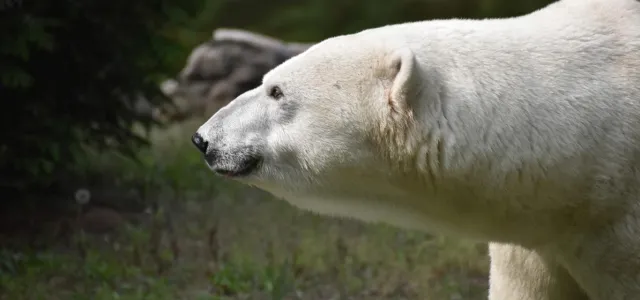Asheboro, N.C. Aug. 24, 2020 -- Diesel, a California sea lion, who one zookeeper remembered as a "chatty goofball full of energy," passed away on Aug. 18. Diesel arrived at the Zoo in 2015 with another sea lion pup named Owen after both were deemed unfit to be returned to the wild.
The veterinary team anesthetized Diesel after observing he experienced eye pain and intermittent episodes of loss of appetite. Though successfully anesthetized for exams in the past, Diesel developed an abnormal breathing pattern during recovery from this anesthesia procedure and went into cardiopulmonary arrest. Despite resuscitation efforts, including CPR, Diesel passed away. Necropsy (animal autopsy) and a full pathology report will provide more information about his cause of death in the coming weeks.
As a young pup, Diesel was found stranded on the beach in California and brought to a marine mammal rehabilitation center for care. Once stable, he was released back into the wild. He stranded again shortly after release, prompting marine mammal rehabilitation experts to deem him unable to survive in the wild. He was then brought directly to the North Carolina Zoo in July 2015.
California sea lions are known for their intelligence and playfulness and are very social animals. Diesel was a favorite of guests and keepers because of his charismatic personality. California sea lions live along the western North America coastline from Alaska to Mexico.
Sally Adams, one of his zookeepers, described him this way: "Diesel had a big sparkling personality. He epitomized what a California sea lion is. He was a chatty goofball full of energy, always eager to learn new things and show off anything new.”
Male sea lions can weigh up to 850 pounds and can grow up to seven feet in length. Females grow to 220 pounds and up to six feet in length. They can live up to 14 years in the wild.
In the United States, the California sea lion is protected under the federal Marine Mammal Protection Act (MMPA), passed in 1972, which outlaws hunting, killing, capture, and harassment of the animal. Since the MMPA was enacted, California sea lion populations have thrived. The International Union Conservation of Nature (IUCN) lists the California sea lion as Least Concern due to the increasing population size.
###
About the N.C. Department of Natural and Cultural Resources
The N.C. Department of Natural and Cultural Resources (NCDNCR) is the state agency with a vision to be the leader in using the state's natural and cultural resources to build the social, cultural, educational and economic future of North Carolina. NCDNCR's mission is to improve the quality of life in our state by creating opportunities to experience excellence in the arts, history, libraries and nature in North Carolina by stimulating learning, inspiring creativity, preserving the state's history, conserving the state's natural heritage, encouraging recreation and cultural tourism, and promoting economic development.
NCDNCR includes 27 historic sites, seven history museums, two art museums, two science museums, three aquariums and Jennette's Pier, 39 state parks and recreation areas, the North Carolina Zoo, the nation's first state-supported Symphony Orchestra, the State Library, the State Archives, the N.C. Arts Council, State Preservation Office and the Office of State Archaeology, along with the Division of Land and Water Stewardship. For more information, please visit www.ncdcr.gov.

